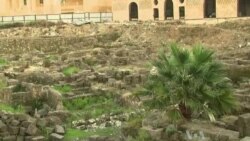BEIRUT —
Lebanon’s Garden of Forgiveness is a work in progress conceived by British-Lebanese citizen and psychotherapist Alexandra Asseily. It aims to nurture peace and healing in a country still recovering from a 15-year civil war of religious factions. But the garden has been beset by delays. Last month, Asseily hosted a ceremony near the garden, bringing together people from all religious backgrounds to celebrate their common beliefs.
Alexandra Asseily first came to Lebanon in 1966. She married a Lebanese man and raised her children in Lebanon.
Then, in 1975, Lebanon's civil war broke out.
“During the war I became very distressed about how is it possible that we as human beings can, from one day to another, go from being nice happy people to fighters, killers, destroyers,” Asseily said.
So, in 1998, Asseily came up with the idea for the Garden of Forgiveness. It was approved and then designed by two well-known architects and is located between archaeological relics and religious structures in the heart of Beirut.
Over the years, the garden became a symbol of peace.
In 2005, family members of September 11 victims visited the garden. They planted an olive tree and, under it, buried photos of loved ones who were killed in the attacks.
But in 2006, with Lebanon at war again, work on the garden was suspended.
The project is still stalled because of a disagreement between the developer who owns the land and a nearby Lebanese Army base.
Last month, during of The Feast of the Annunciation - a religious holiday celebrated by Christians and some Muslims -- Lebanese gathered at the Nourieh shrine, just nearby, to express solidarity.
The garden is situated on what was known during the civil war as “the green line.” At the time, it separated Christian and Muslim parts of the city. Ziad Mikati of the Islamic-Christian Foundation says it's the perfect site for the garden.
“In this area, where we have three cathedrals and thee mosques around us. It's a sign from God to all of us that, over here where the olive trees are growing and where the Annunciation was made very visible, to come together and start worshiping together for one cause, which is Lebanon,” Mikati said.
During the ceremony, religious leaders read together and individuals from sects that once battled each other recounted the pain of their wartime experiences.
Asseily hopes gatherings like this will keep the garden project alive.
Alexandra Asseily first came to Lebanon in 1966. She married a Lebanese man and raised her children in Lebanon.
Then, in 1975, Lebanon's civil war broke out.
“During the war I became very distressed about how is it possible that we as human beings can, from one day to another, go from being nice happy people to fighters, killers, destroyers,” Asseily said.
So, in 1998, Asseily came up with the idea for the Garden of Forgiveness. It was approved and then designed by two well-known architects and is located between archaeological relics and religious structures in the heart of Beirut.
Over the years, the garden became a symbol of peace.
In 2005, family members of September 11 victims visited the garden. They planted an olive tree and, under it, buried photos of loved ones who were killed in the attacks.
But in 2006, with Lebanon at war again, work on the garden was suspended.
The project is still stalled because of a disagreement between the developer who owns the land and a nearby Lebanese Army base.
Last month, during of The Feast of the Annunciation - a religious holiday celebrated by Christians and some Muslims -- Lebanese gathered at the Nourieh shrine, just nearby, to express solidarity.
The garden is situated on what was known during the civil war as “the green line.” At the time, it separated Christian and Muslim parts of the city. Ziad Mikati of the Islamic-Christian Foundation says it's the perfect site for the garden.
“In this area, where we have three cathedrals and thee mosques around us. It's a sign from God to all of us that, over here where the olive trees are growing and where the Annunciation was made very visible, to come together and start worshiping together for one cause, which is Lebanon,” Mikati said.
During the ceremony, religious leaders read together and individuals from sects that once battled each other recounted the pain of their wartime experiences.
Asseily hopes gatherings like this will keep the garden project alive.









